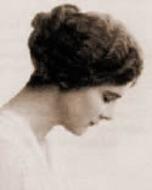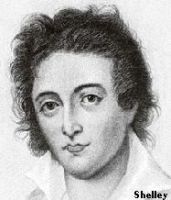Robert Frost's wonderful nature poetry--
Fire and Ice
Some say the world will end in fire,
Some say in ice.
From what I've tasted of desire
I hold with those who favour fire.
But if it had to perish twice,
I think I know enough of hate
To say that for destruction ice
Is also great
And would suffice.
A Hillside Thaw
To think to know the country and now know
The hillside on the day the sun lets go
Ten million silver lizards out of snow!
As often as I've seen it done before
I can't pretend to tell the way it's done.
It looks as if some magic of the sun
Lifted the rug that bred them on the floor
And the light breaking on them made them run.
But if I though to stop the wet stampede,
And caught one silver lizard by the tail,
And put my foot on one without avail,
And threw myself wet-elbowed and wet-kneed
In front of twenty others' wriggling speed,--
In the confusion of them all aglitter,
And birds that joined in the excited fun
By doubling and redoubling song and twitter,
I have no doubt I'd end by holding none.
It takes the moon for this. The sun's a wizard
By all I tell; but so's the moon a witch.
From the high west she makes a gentle cast
And suddenly, without a jerk or twitch,
She has her speel on every single lizard.
I fancied when I looked at six o'clock
The swarm still ran and scuttled just as fast.
The moon was waiting for her chill effect.
I looked at nine: the swarm was turned to rock
In every lifelike posture of the swarm,
Transfixed on mountain slopes almost erect.
Across each other and side by side they lay.
The spell that so could hold them as they were
Was wrought through trees without a breath of storm
To make a leaf, if there had been one, stir.
One lizard at the end of every ray.
The thought of my attempting such a stray!
The Freedom of the Moon
I've tried the new moon tilted in the air
Above a hazy tree-and-farmhouse cluster
As you might try a jewel in your hair.
I've tried it fine with little breadth of luster,
Alone, or in one ornament combining
With one first-water start almost shining.
I put it shining anywhere I please.
By walking slowly on some evening later,
I've pulled it from a crate of crooked trees,
And brought it over glossy water, greater,
And dropped it in, and seen the image wallow,
The color run, all sorts of wonder follow.
On Looking Up By Chance At The Constellations
You'll wait a long, long time for anything much
To happen in heaven beyond the floats of cloud
And the Northern Lights that run like tingling nerves.
The sun and moon get crossed, but they never touch,
Nor strike out fire from each other nor crash out loud.
The planets seem to interfere in their curves
But nothing ever happens, no harm is done.
We may as well go patiently on with our life,
And look elsewhere than to stars and moon and sun
For the shocks and changes we need to keep us sane.
It is true the longest drouth will end in rain,
The longest peace in China will end in strife.
Still it wouldn't reward the watcher to stay awake
In hopes of seeing the calm of heaven break
On his particular time and personal sight.
That calm seems certainly safe to last to-night.
--Cat






